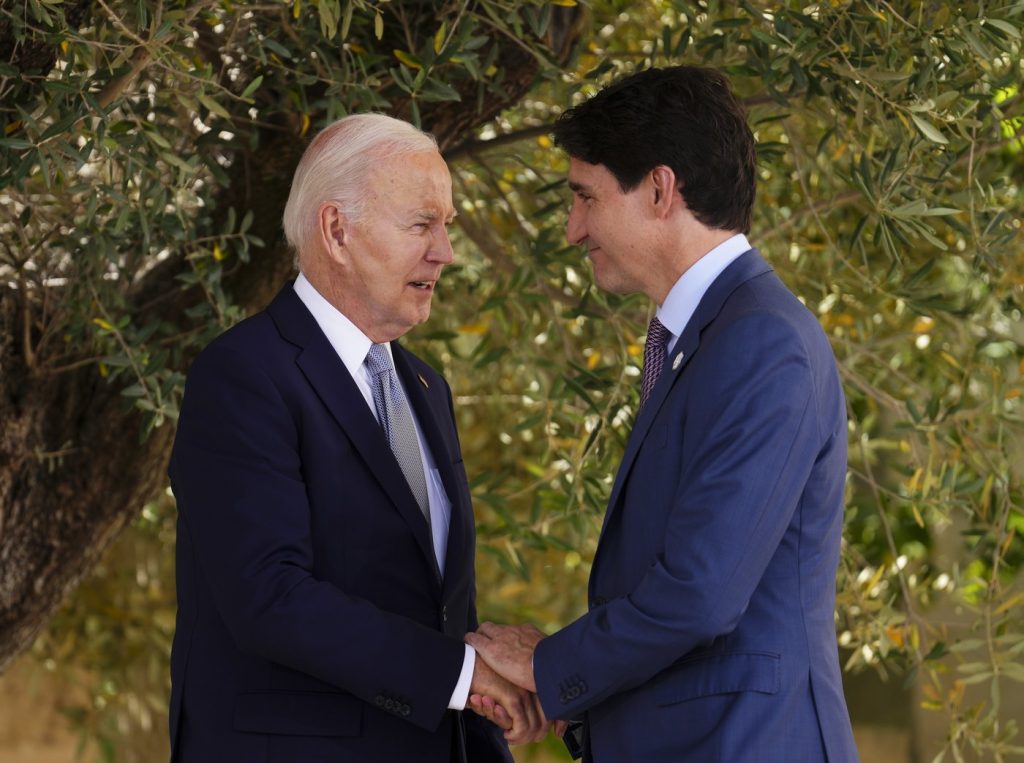Biden praises Trudeau as friend but other leaders remain mum on his resignation

Posted Jan 7, 2025 10:51:51 AM.
Last Updated Jan 7, 2025 07:15:17 PM.
OTTAWA — U.S. President Joe Biden praised Justin Trudeau as a friend and ally Tuesday, making him one of just a handful of world leaders weighing in on the prime minister’s plan to resign his post later this year.
The muted response from world leaders comes despite Trudeau’s efforts to emphasize international connections over his nine years in office. Some analysts suggest those efforts were not always well received.
Trudeau announced Monday he will retire as prime minister as soon as a new Liberal leader is chosen. Biden said he spoke with Trudeau not long after that announcement.
“Over the last decade, Prime Minister Trudeau has led with commitment, optimism, and strategic vision,” Biden said in a written statement.
“The U.S.-Canada alliance is stronger because of him. The American and Canadian people are safer because of him. And the world is better off because of him,” wrote the president.
The small number of foreign officials who publicly noted Trudeau’s pending departure include Ireland’s foreign minister Micheál Martin, who thanked Trudeau for his “significant contribution to the global stage,” and Japanese foreign minister Takeshi Iwaya, who thanked Trudeau for his work with the G7.
“He has made tremendous efforts, and I’d like to extend my heartfelt respect,” the ministry’s English interpreter translated Iwaya as saying during a news conference Tuesday.
“Japan and Canada are important strategic partners in the Indo-Pacific region,” he said, adding the G7 is critical to maintaining an international rules-based order facing numerous challenges.
The British embassy in Ottawa provided a statement Tuesday attributed to a spokesperson for U.K. Prime Minister Keir Starmer.
“The Prime Minister has always worked closely with the Canadian PM and wishes him well for the future,” the statement reads. “Canada and the U.K. have a historic, close relationship and that will continue to grow.”
The German embassy in Ottawa confirmed that the German government has offered no comment on Trudeau’s resignation, which occurred during that country’s ongoing election. The Canadian Press asked diplomatic missions for the other G7 members — France, Italy and the European Union — for comment Tuesday but has not received responses.
Beijing, New Delhi and Moscow had not commented on Trudeau’s departure as of Tuesday afternoon.
Stephen Nagy, a senior fellow with the Asia-Pacific Foundation based in Tokyo, said Trudeau’s “evangelistic” focus on progressive politics strained international relations, although some of his policy choices resonated.
“We’re probably worse off, in terms of our Canadian footprint within the region,” he said.
Nagy said most Asian countries were pleased with the Indo-Pacific strategy the Liberals released in late 2022 because it allocated significant funds to bolster projects to detect illegal fishing and monitor North Korea’s sanctions evasion.
Canada recently signed a free-trade deal with Indonesia that has vast potential for both countries, despite being “very late to the game” in boosting ties with Southeast Asia, Nagy said.
Nagy said many conservative countries “superficially welcomed” Canada’s championing of gender equality and its demands that it be part of trade agreements.
“Whether we like it or not, almost all of these countries in the region are run by men that dye their hair dark,” he said.
Canada shifted its attention to Japan only when relations with China soured, Nagy said. He called that “a bit insulting,” even if Tokyo is glad to partner on supply chains, international development and the environment.
He said Japan and South Korea want Canada to push back more on Russia’s co-ordination with North Korea and China.
“His government continued to misread the region’s priorities and underinvested in the most important partners,” in addition to serious strains between Canada, India and China, Nagy said.
In Europe, Trudeau took office with “immense” popularity and high expectations, which he met at the start before later falling short, said Marcin Gabrys, chair of Canadian Studies at Jagiellonian University in Krakow.
“Trudeau’s leadership, and Canada’s leadership in general, has been perceived as weakened over the years,” he said.
“Canada under Trudeau set many goals, but in reality never fulfilled them.”
Europeans praised Trudeau for reversing the Conservatives’ move away from international climate-change accords, and for doubling down on multilateralism, refugee protection and human rights.
Gabrys said Trudeau remains an icon across Europe for both liberals and conservatives.
A 2017 book, whose Polish title reads “Canada: The World’s Favourite Country,” featured Trudeau’s face and made a stir in Poland. Left-leaning urbanites looked to Trudeau as a feminist icon, while the country’s strongly Catholic rural regions and former government saw Canada as dangerously liberal on matters like abortion and LGBTQ+ rights.
Europeans welcomed Canada’s NATO deployment in Latvia, despite it falling short of spending targets. Canada’s embassy in Warsaw gained prominence in Poland for helping resettle displaced Ukrainians and for supporting Belarus’ opposition movement.
But as time went on, Trudeau was unable to deliver liquefied natural gas to European countries that sought alternatives to Russian energy. Canada also failed to make as much progress on climate as many European leaders hoped.
“European leaders expected more support, and I think that would’ve helped the image of Canada on the path to transition from fossil fuels to a green economy,” said Gabrys.
“That’s something I think, from a European perspective, could be considered as Trudeau’s failure.”
This report by The Canadian Press was first published Jan. 7, 2025.
— With files from Kelly Geraldine Malone in Washington.
Dylan Robertson, The Canadian Press








